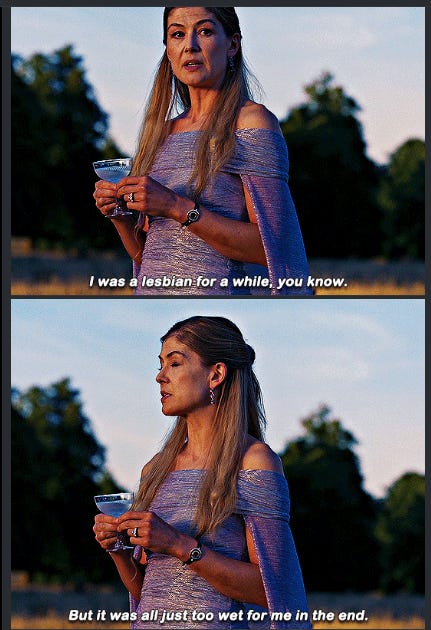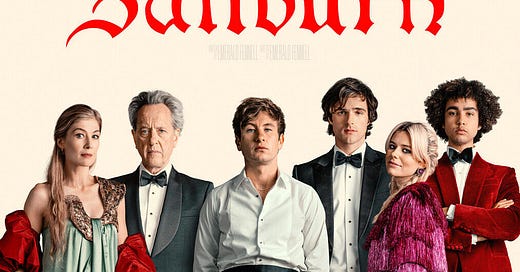This post contains spoilers of the film Saltburn throughout.
Happy Awards Season everybody! It’s been years since I actually watched a show in real time – how many times can you watch a C-list comic flub his way through seedy, misogynistic jokes before it grows tedious? But I still follow loosely along, checking to see who won and who killed the red carpet (a moment here, for the people’s princess Ayo Edebiri, who did both at the Critics Choice Awards, Golden Globes, and Emmys – Yoruba girls on 🔝😌). Oscar noms come out this Tuesday, and in advance of that I’ve been watching all the buzzy films that keep coming up in conversation. Among these is Saltburn, a thriller-ish dark comedy from writer-director Emerald Fennell.
Though not an entirely successfully satire, Saltburn does poke fun at the ultra-wealthy aristocracy, using Oliver (Barry Keoghan), a scholarship student at Oxford as our entrée into this world through his friendship with Felix (Jacob Elordi of Priscilla, The Kissing Booth). My first thought upon finishing the movie? I’m so happy for the girlies on Tumblr. In many ways, the film feels designed for that site in its prime: vibrant cinematography, two heartthrobs (one conventionally hot for the normies, one less so for alt gals), a rambling country estate with a literal labyrinth, and plentiful homoeroticism to gifset into oblivion. The premise is simple: Oliver befriends Felix, who invites him to spend the summer at his family’s estate, Saltburn. Murderous hijinks ensue.

I enjoyed it, but the film was good, not great, shining in the cutting, absurd dialogue and mannerisms of the Catton family – probably because Fennell, a jewelry heiress who graduated from Oxford, is intimately acquainted with this world. While watching, I was often reminded of other works that feature badly behaved Oxford students–a surprisingly robust genre, now that I’m thinking about it–and how they played with many of the themes Saltburn is engaging with, only with more nuance and thoughtfulness. See: Doris Lessing’s short story “England vs. England” for class anxiety and prejudice; Alan Hollinghurst’s novel The Line of Beauty for sexuality and queer identities (also adapted into a limited series by the BBC starring Dan Stevens of Downton Abbey, but the book is better). However, neither of these works feature Rosamund Pike doing some fab work as a pompous bitch draped in Valentino, so that’s a big plus in Saltburn’s favor.

Following the big twist – that Oliver has had a perfectly respectable middle class upbringing with loving, healthy parents, not the abusive dead dad and alcoholic mother he made up to trap Felix into a pity friendship – the film slides into a shaky third act that features a shocking but somewhat silly scene of Oliver having sex (?) with the soil of Felix’s fresh grave. It doesn’t illuminate anything new about the character: by then, we already know he’s a maniac and in love with Felix, so what exactly is the reason…? But that’s enough on that. Ultimately, the reveal about Oliver’s background and the conclusion of the film left me thinking about the dangers of comparison. You’re probably familiar with the adage, “comparison is the thief of joy,” but Saltburn illuminates how it’s beyond that. Comparison, like Oliver, is murderous, killing off your ability to have perspective, making you unable to be grateful for what you already have by making you focus relentlessly on what you don’t.
Oliver is exposed to the kind of mega-wealth few of us encounter IRL, but now we have social media to fill the gap. On our feeds, real-life heiresses mingle with celeb kids who’ve been grounded for attempting to charter a helicopter without parental permission, showing up alongside the 22-year-old influencer who’s a regular gal just like you – only she lives in a chic industrial loft in [expensive city] and goes on vacation every month. It’s only natural that being bombarded with these images makes us start to consider if we’re good enough, or behind in some imaginary timeline, warping our minds to covet excess instead of focusing on our own good fortune.
I will be honest: for years I was hesitant to show more of my life on camera because it wasn’t “aesthetic” enough. I rewear my non-designer clothes often; my apartment is filled with hand-me-down furniture that’s a touch too cigar lounge for my personal taste (a man bought it), instead of the trendy cloud couch that’s already on its way out. But then it’s like – hello???? Being a gifted a couch means you don’t have drop $2,000 on a new one (or $12,000 if we’re talking about the Restoration Hardware one in question 🙃). Stop being annoying and just be grateful, you big dummy!! (That’s me to me, fyi). Similarly, it doesn’t even occur to Oliver that the plot choices he’s making to craft his sob story are someone else’s actual reality – and they’re probably not a student at Oxford. Sure, the Cattons are elitist and vapid, but Oliver is more deserving of their wealth because he’s…willing to kill for it? (A shame that he didn’t have the benefit of well-placed ancestors to do the murdering for him, like his aristocratic peers.)
A recurring theme in Brain Rot is that the corny stuff is often true, and this week is no different. I hate to say it, because it’s truly Frito-Lay levels of cheesiness, but gratitude is the attitude, and comparison kills our ability to be grateful because it orients us to focus on lack. We become preoccupied with absence, ignoring all the good that is present around us, privileging the material over the intangible. Oliver was so focused on the portraits, marble statues, and manicured hedges of Saltburn that he was willing to abandon the genuine love and support of his parents in exchange for the Cattons’ haughty iciness. I mean – yuck!
Even the callousness that Felix’s mother displays upon the death of a close friend (“she’d do anything for attention,” she remarks) is not enough to deter him. And that’s because chronic comparison causes brain rot (derogatory) – you cannot see things as they really are. How many of us are ignoring the myriad comforts of our first world lives because we don’t have even more stuff? To fight this, I’ve created a running notes app list that I read and add to whenever I feel the comparison deficit disorder acting up. I’ve made it a habit to track things I feel grateful for, small (crossing every item off my to-do list), large (the love of my family and friends), and transcendental (Donna Summer’s Bad Girls album). It isn’t a perfect method, but at least it gives me a laugh.
Are you letting comparison keep you from appreciating all that you have? If yes, I say this with all the love in the world: stop being annoying and just be grateful, you big dummy 💓
Final Thoughts (& Another Spoiler)
I think many of us have had a deranged crush on a tall man who didn’t deserve it (Jacob Elordi is 6’5”, for anyone who needs that information), but if you ever feel compelled to drink a man’s c*m-laced bath water, please seek psychiatric help – or an exorcism. I know a great holy river if you need one!
Lastly, I want to share this video from a Q&A following a screening of the film, which is doing something for a lot of people:
I said it once and I’ll say it again: I’m so happy for the Tumblr girls!
This is an admin-heavy Sunday for me, lots of invoices and prepping for tax season, so I hope your day is better than that. Mid-week I’ll be back with a deep dive on seasons 1-3 of Sex and The City and its terrible men (all six was getting out of hand, and I’m still wrapping up season five, which is…definitely a thing!) for paid subscribers, and on Sunday we’re talking about my very least favorite thing: patience (🙄)
Until next Sunday,
Lola xx





